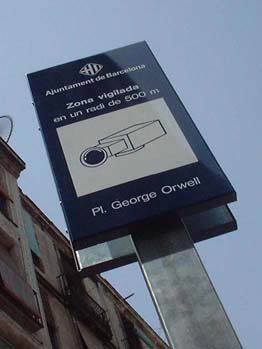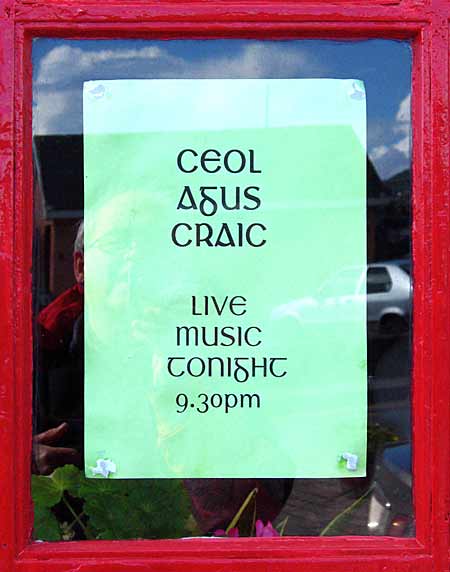
The George Orwell Plaza in Barcelona has 24×7 video surveillance. Thanks to BoingBoing for the link.


The George Orwell Plaza in Barcelona has 24×7 video surveillance. Thanks to BoingBoing for the link.

What is it about ducks? The other morning, Chris Patten, the former EU Commissioner for External Affairs (and now Chancellor of Oxford University), described the EU Constitution as a “dead duck” after the Dutch referendum result. This morning I heard another politician on the radio describing Jacques Chirac in the following terms: “He may be a lame duck president, but he’s a lame duck with a bite”. And who has ever seen a lame duck anyway?
Update: My daughter reminds me that she was once bitten by a duck. But that was because he coveted the bit of chocolate cake she was holding at the time.
Today’s Observer column on following what Vannevar Bush called “associative trails” — into the confessional.
Ed Felten has some interesting reflections on the threat of cyberattack on the US information infrastructure. He puts his finger on the nub of the problem:
the traditional governmental processes are ill-suited for addressing cyberthreats. The main reason is that national security processes result in plans for governmental action; but the cyberthreat problem can be solved only by private action. The cyber infrastructure is in private hands, and is designed to serve private ends. Government can’t easily change it.
So what can be done? One idea he discusses is that since unprotected computers in private hands make the entire infrastructure vulnerable, then perhaps individual computer users ought to be personally liable for damage caused by their carelessness/ignorance. Ed points out that there are lots of things wrong with this idea. But, oddly, he doesn’t discuss another obvious possibility — that software manufacturers like Microsoft should be legally liable for damage caused by the security holes in their products. I’ve never understood why the computer industry should be able to avoid liability in this way. Just imagine the fuss there would be if automobile manufacturers were able to avoid being held responsible for flaws in their products. It’s unthinkable. But we tolerate this crazy situation with computers. Why?
Quentin had an unfortunate accident. He wanted to check a word, so went to take down the OED (he doesn’t say which edition, so I’m guessing it was the wonderful two-volume Shorter Oxford) from a shelf over his desk. But the book fell on his PowerBook and did a good deal of damage. Moral of the story: keep the OED on the desk!

I know — I’m beginning to sound like Magritte. But this is a clever bird-scarer created by friends to stop feathered fiends frustrating their attempts to re-seed the lawn. Having magnifying glasses for the eyes is a really nice touch, don’t you think.

Photographed at a concert recently. This kid had his back to the orchestra from beginning to end. Reminded me of the famous description of a psychiatrist as “someone who goes to Les Folies Bergeres and watches the audience”. Photographed with the unobtrusiveness that only an M-series Leica can provide.
Well, well… According to this Guardian report,
Dyson vacuum cleaners, Smeg dishwashers and Hoover washing machines may be the more fashionable appliances on the domestic scene, but they are also the most likely to break down, the consumers’ magazine Which? says today. Owners have to have them repaired more often than those who opt for less trendy brands, according to the experiences of nearly 15,000 Which? readers who responded to a survey. People are buying into “fashion” brands for their homes, despite them proving far more unreliable, the researchers say.
So I’ll stick with our boring old Miele, then.
… but it’s getting harder with all those pesky Blogs around. Intriguing story from this morning’s New York Times:
Clear Channel, thought by its critics to be the best representative of the creeping corporate weaseldom that has brought on the ruination of commercial radio, tried to dupe radio listeners in Akron, Ohio, by posing as an anticorporate pirate radio station.
Via some audio trickery, Clear Channel made it sound as though pirate signals from “Radio Free Ohio” were bleeding into several of the other stations it owns. The “pirate” signals, and a Web site set up to promote the new station, lashed out at corporate radio.
Suspicious, someone using the handle “Turbo Ninja” looked up the Web site registration for radiofreeohio.org, discovered it was owned by Clear Channel, and posted the findings to the message boards on the Web site of the independent station WOXY.
“They’re ripping corporate radio as a means of encouraging people to listen to a slightly different kind of corporate radio,” Turbo Ninja wrote.
The posting was picked up by several blogs, and in turn by The New York Times, which quoted a Clear Channel executive saying, “There’s a hole in the market here and we’re going to fill it.”
That hole is “progressive talk,” a notion that sent Carrie MacLaren reeling. She runs the blog stayfreemagazine.org, one of the first to publicize what Clear Channel was up to. “Progressive talk,” she wrote. “Yes, I will say that again: (Radio Free Ohio) is to be a progressive talk station! Now if you’ll excuse me I think I’ll go shove an icepick in my ear.”

A sign in the window of a Dingle pub. ‘Ceol’ is the Irish for song or music. There is, however, a lively etymological debate about ‘craic’. It is conventionally taken to mean fun and/or bonhomie (often fuelled by alcohol). But some authorities hold that it derives from ‘ag buaileadh craiceann’ or ‘beating skin’ — a reference to “a highly private inter-personal (and usually inter-gender) activity which tends to promote mutual enjoyment, and sometimes progeny”. Er, I couldn’t possibly comment.